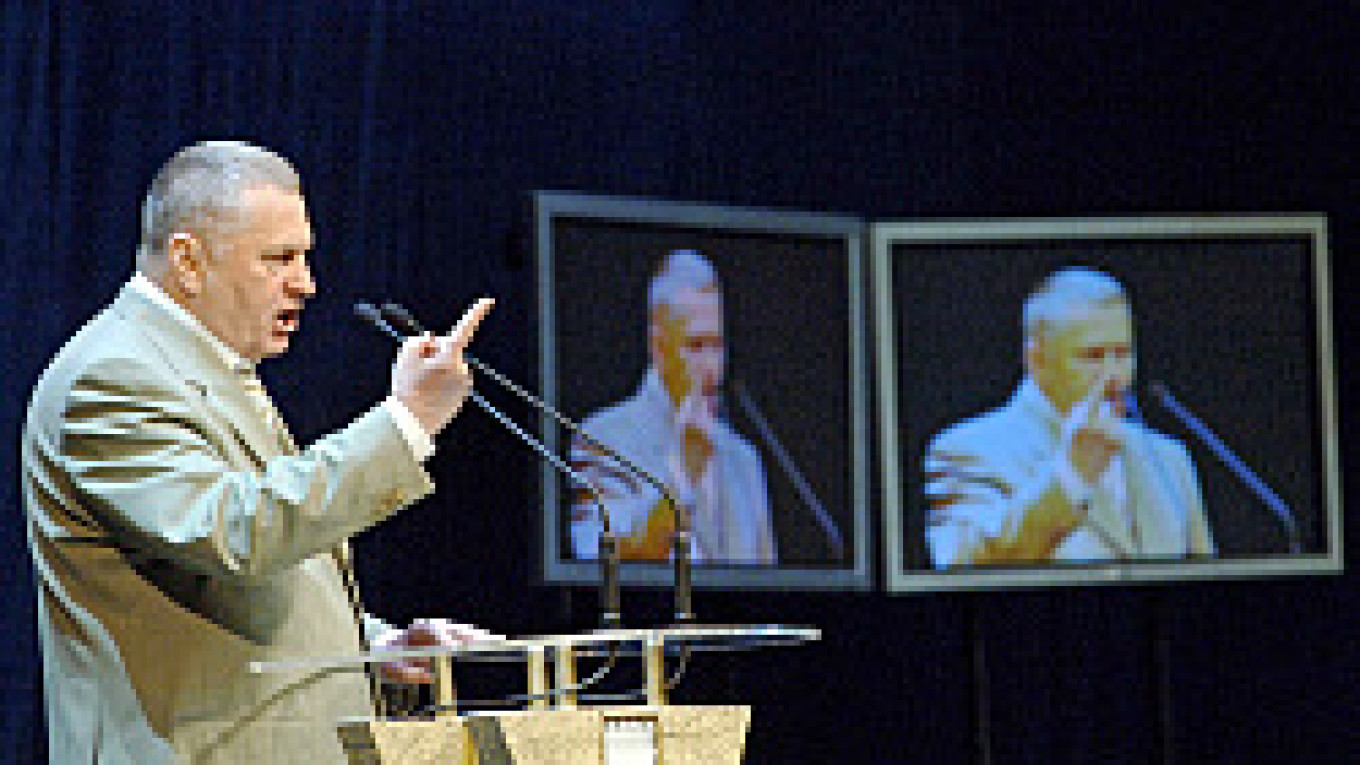On Tuesday, the ultranationalist leader of the Liberal Democratic Party came up with yet another zinger: Great Britain, he declared, is now Public Enemy No. 1.
Addressing a crowd of 6,000 at a party celebrating his 60th birthday, Zhirinovsky explained why London posed such a grave threat to Russia's national security.
"As long as there is Great Britain, there will be a plot against us," he told the crowd in a speech in the Kemlin Palace that ran more than two hours.
Zhirinovsky accused Britain of sheltering senior Chechen separatist Akhmed Zakayev, who is wanted in Russia on terrorism charges, and oligarch Boris Berezovsky.
Other British offenses, apparently, include founding the Communist Party of the Soviet Union.
A spokesman for the British Embassy in Moscow responded: "People often make surprising and exuberant statements during their birthday celebrations. We don't think that there is any need to comment on Mr. Zhirinovsky's latest rantings."
The spokesman added that the British Embassy nonetheless wished Zhirinovsky a happy birthday.
While Russian-British relations have suffered no major setbacks in recent years, Russia did accuse Britain in January of planting a listening device in a rock in a Moscow park.
The birthday celebration doubled as a Liberal Democratic Party meeting. Rallying the troops, Zhirinovsky pronounced: "The Bolsheviks have failed. The democrats are bankrupt. LDPR is the third path."
The troops lapped it up.
"He is a real man," Marina Anikina, a civil servant in her mid-30s, said of Zhirinovsky.
Alexei Zagumennikov, 26, who traveled 350 kilometers from the village of Lev Tolstoy to hear Zhirinovsky, said: "I've been waiting for months to get the chance to see him."
Boris Melnikov, 56, one of Zhirinovsky's well-wishers, said he particularly enjoyed the entertainment provided by the birthday boy: 20 models whose job it was to pose in photographs with the guests "so that," Zhirinovsky explained, "every man can feel like he's a man."
Zhirinovsky became a household name in 1993, after his newly formed party came in first in parliamentary elections, capturing nearly 23 percent of the vote nationwide.
Since then, the party's fortunes have dimmed. In 1995, the Liberal Democrats placed second after Gennady Zyuganov's Communist Party, garnering a little more than 11 percent of the vote. And in 1999, the party won 6 percent. Still, Zhirinovsky remains something of a fixture in the public consciousness, appealing to many Russians' anxieties about the free market, the shrinking population and a sense that the country lost its way on the road away from communism.
Zhirinovsky, a State Duma deputy, has routinely battled, literally, with fellow deputies.
He has forged ties with right-wing extremists in other countries, including Jean Marie Le Pen of France and Belgium's Daniel Feret, who was invited to Tuesday's party.
And he has kowtowed to Russian anti-Semites, calling on the authorities in January to ban Jewish groups, which he said amount to "nothing less than Satanism."
Earlier, he accused Jews of ruining the country, sending women abroad as prostitutes, selling children and organs to the West, and provoking the Holocaust -- despite acknowledging in 2001 that he was, in fact, half-Jewish.
"My father was a Jew, a Polish Jew," he wrote in his book "Ivan Close Your Soul."
While many have written him off as a buffoon -- Zhirinovsky recently suggested that the best way to fight avian flu would be to shoot anything with feathers -- some analysts say he plays an important role in Russian politics.
Mark Urnov of the Higher School of Economics said the Kremlin had long used Zhirinovsky to sound out public opinion on controversial issues.
But on Tuesday, Zhirinovsky, whose hobbies include volleyball and target-shooting, hardly sounded like a leading politician waxing eloquent on the challenges facing the nation.
"You have 500 million Russian Kalashnikovs all over the world," he said. Then he added, somewhat enigmatically, "but we don't want any war here."
Zhirinovsky added that the Liberal Democrats, who have become a magnet for xenophobic, anti-Semitic and revanchist elements across the Russian Federation, had been a force for good.
"Everything positive that has happened in our country is our achievement," he said. "We never did anything bad."
A Message from The Moscow Times:
Dear readers,
We are facing unprecedented challenges. Russia's Prosecutor General's Office has designated The Moscow Times as an "undesirable" organization, criminalizing our work and putting our staff at risk of prosecution. This follows our earlier unjust labeling as a "foreign agent."
These actions are direct attempts to silence independent journalism in Russia. The authorities claim our work "discredits the decisions of the Russian leadership." We see things differently: we strive to provide accurate, unbiased reporting on Russia.
We, the journalists of The Moscow Times, refuse to be silenced. But to continue our work, we need your help.
Your support, no matter how small, makes a world of difference. If you can, please support us monthly starting from just $2. It's quick to set up, and every contribution makes a significant impact.
By supporting The Moscow Times, you're defending open, independent journalism in the face of repression. Thank you for standing with us.
Remind me later.


